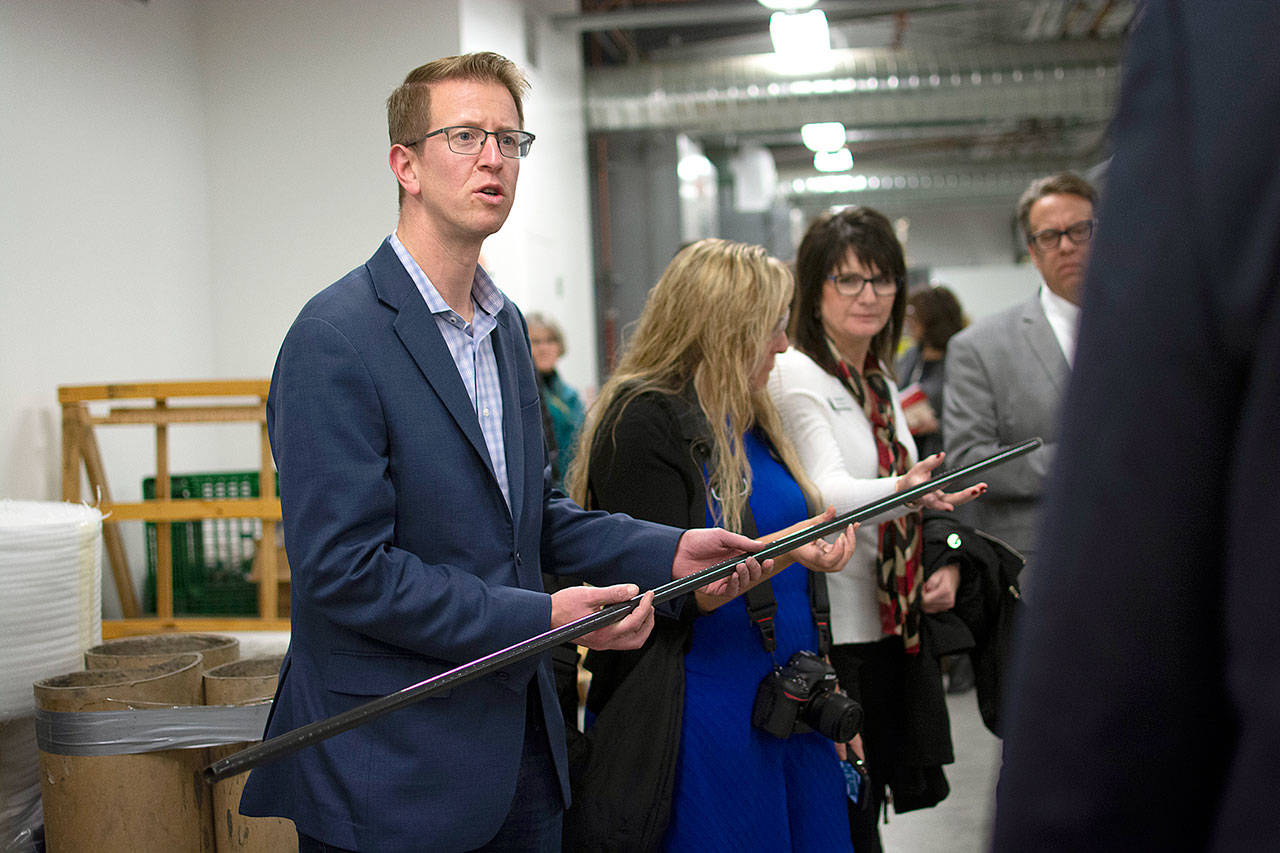PORT ANGELES — U.S. Rep. Derek Kilmer joined First Federal Community Foundation officials as they presented a $50,000 check to the Composite Recycling Technology Center in Port Angeles during a tour of the plant.
The money will fund a demonstration Pennies for Quarters tiny home for veterans made with CRTC’s advanced cross-laminated timber.
“This is awesome,” Kilmer said after meeting with two dozen CRTC, First Federal, Port of Port Angeles and Pennies for Quarters officials Monday.
“Our office mission is to create more economic opportunities for more people in more places, and I think you guys are trying to drive innovation in a way that can do that in this area.”
Kilmer, D-Gig Harbor, represents the 6th Congressional District which includes the North Olympic Peninsula.
CRTC will use the $50,000 grant from First Federal Community Foundation next year to build the demonstration tiny home of modified coastal western hemlock harvested from the North Olympic Peninsula.
Meanwhile, CRTC is seeking $757,000 in state and federal grants to further the development of its advanced cross-laminated timber system.
The cross-laminated timber panels will have carbon fiber strips for increased strength. The thermally-modified wood is energy efficient and resistant to wind, rot and mildew, CRTC officials said.
“We estimate that a 240-square-foot home could go up in about three days,” CRTC Chief Executive Officer Dave Walter told Kilmer and his staff.
“We certainly could build bigger homes as well, but the focus I think at least initially is going to be on the smaller homes.”
Pennies For Quarters purchased a seven-acre site at the end of Devanny Lane off Airport Road west of Port Angeles to build 24 tiny homes for North Olympic Peninsula veterans and their families.
The tiny homes will be energy efficient and will target achieving zero total energy consumption, officials said.
“We’ve decided to partner with CRTC and use the ACLT [advanced cross-laminated timber] because of the durability,” said Matthew Rainwater, Pennies for Quarters founder and president.
“It’s going to cost a little bit more per tiny house, but the durably and the sustainability is going to outweigh it long term.”
In a Tuesday interview, Walter said it would cost about $47,000 to build a 240-square-foot tiny home using advanced cross-laminated timber.
The first demonstration home will be built off site for an estimated $70,000, Walter said.
Pennies For Quarters continues to raise funds for the 24-unit project to help homeless veterans and their families. Veterans will be allowed to live in the homes for up to two years to get their lives in order.
Background checks will be conducted on prospective residents, and participants will sign a code of conduct that will include no alcohol or drugs on the premises.
Single veterans and veterans with spouses will occupy the 240-square-foot tiny houses. Families of four will live in the larger, 400-square-foot homes.
Rainwater said he hoped the CRTC prototype would help the fundraising effort.
Once completed, the village will include a central facility with laundry and counseling services.
“We’re going to have AA [Alcoholics Anonymous] meetings and NA [Narcotics Anonymous] meetings,” Rainwater told Kilmer.
“We’re going to have a bank of computers in the central facility to be able to give the homeless veterans that are part of the program access to online items, email to be able to reach out to family, get back in touch, things of that nature.
“We’re also going to have a commercial kitchen and provide them up to three meals a day,” Rainwater added.
The tiny homes will be built in quads to encourage the veterans to socialize with their neighbors.
“When you’re homeless, you’re not worried about necessarily making friends or talking to people,” Rainwater said.
“You’re worried about day-to-day survival.”
Those who live in the tiny homes will be required to pass monthly drug tests.
Coastal western hemlock grows abundantly on the Olympic Peninsula but is susceptible to cracking in traditional building applications, Walter said.
That’s why the thermally-modified, mildew-resistant interlocking panels will be integrated with recycled carbon fiber, officials have said.
“From an economic impact standpoint, the fact that they’re using western hemlock is so critically important, because it just hasn’t had a huge demand and we have so much supply of that on the Olympic Peninsula,” said Port of Port Angeles Commissioner Colleen McAleer.
“I know that the Makah tribe will be supplying a lot of the timber for this.”
David Flodstrom, First Federal Community Foundation director, said the CRTC grant application was successful because of the tiny home project.
“Affordable housing, particularly veteran housing, is very important to First Fed, and we’ve supported that in a number of areas throughout the places where we have facilities,” Flodstrom said.
“And so it really made a nice fit for us. It made it much easier for the foundation board to make the grant this year.”
Kilmer, a Port Angeles native, said he represents more military veterans than any other Democrat in Congress.
“I actually think we’re a lot stronger as a community because we have men and women who served their country and then come and make this home, but it means we’re grappling with some of these challenges around housing access,” Kilmer said.
“We’re trying to chip away at all these needs. Housing is a big one. Medical care is a big one.”
The CRTC, which opened more than four years ago, employs 15 full-time workers, Walter said.
In addition to cross-laminated timber, CRTC makes portable pickleball nets, park benches, orthotic springs, removable deck railings, wood panels for Benaroya Hall in Seattle and carbon fiber marine cables that can be used instead of plastic rope, Walter said.
________
Reporter Rob Ollikainen can be reached at 360-452-2345, ext. 56450, or at rollikainen@peninsuladailynews.com.

